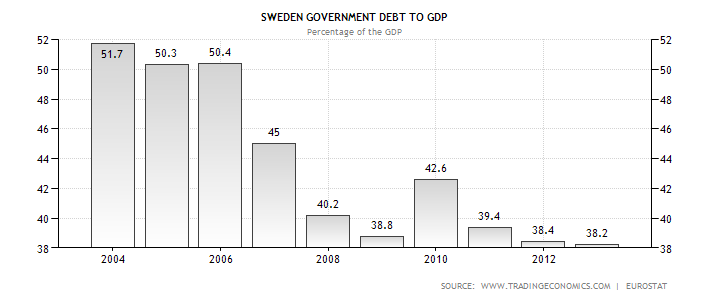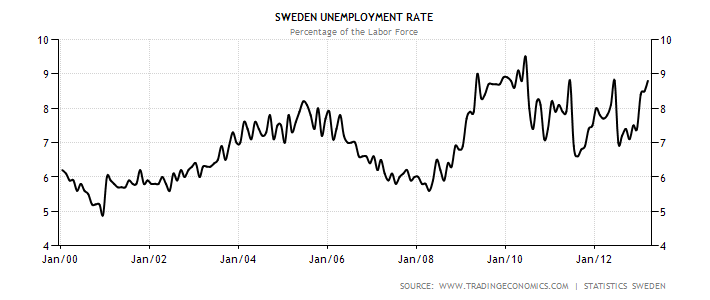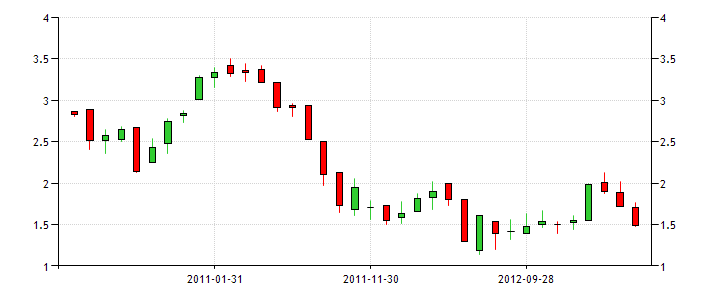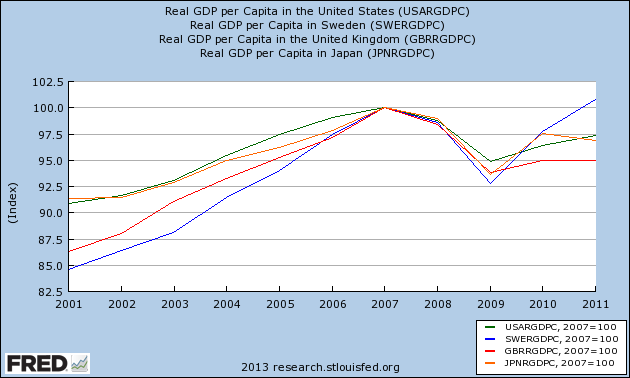The advocates of “austerity now!” are talking about Sweden.
Last year Fraser Nelson wrote in The Spectator:
When Europe’s finance ministers meet for a group photo, it’s easy to spot the rebel — Anders Borg has a ponytail and earring. What actually marks him out, though, is how he responded to the crash. While most countries in Europe borrowed massively, Borg did not. Since becoming Sweden’s finance minister, his mission has been to pare back government. His ‘stimulus’ was a permanent tax cut. To critics, this was fiscal lunacy — the so-called ‘punk tax cutting’ agenda. Borg, on the other hand, thought lunacy meant repeating the economics of the 1970s and expecting a different result.
Three years on, it’s pretty clear who was right. ‘Look at Spain, Portugal or the UK, whose governments were arguing for large temporary stimulus,’ he says. ‘Well, we can see that very little of the stimulus went to the economy. But they are stuck with the debt.’ Tax-cutting Sweden, by contrast, had the fastest growth in Europe last year, when it also celebrated the abolition of its deficit. The recovery started just in time for the 2010 Swedish election, in which the Conservatives were re-elected for the first time in history.
So, how is the Swedish economy doing?
Well, the good thing about assessing the Swedish economy is that Sweden remains monetarily sovereign, meaning that its economy is not dependent upon the monetary policy of a foreign agency like the ECB. This means that it can be fairly assessed side-by-side with other Western monetary sovereigns like Britain, America and Japan.
The thing that austerians are so excited about is that Sweden currently has low debt and is running balanced budgets:
But that hasn’t meant that unemployment has been low. In fact, right now it’s worse than American, British and Japanese unemployment:
And while Sweden’s low debt and balanced budgets may have resulted in low rates, its rates are not significantly lower than Britain and America, and are higher than Japan who carry the highest debt load of all:
But to be fair real GDP growth in Sweden since the crisis has been relatively decent — although notably still below its pre-2008 trend — beating the other three countries who all performed poorly:
I think that Sweden is benefiting less from its actions during the slump and more from its actions during the boom.
In my view, Sweden’s focus on bringing down deficits in the years from 2004 until the crisis in 2008 was very responsible and prudent. Sweden had no wasteful expansionary spending in the mid 2000s on things like occupying Iraq. It was not enacting expensive legislation like No Child Left Behind, Medicare D and unfunded tax cuts that bloated government budgets.
Coming into the crisis with a low debt-to-GDP ratio is very healthy because it gives the government additional fiscal space to cut taxes, and spend money on infrastructure, public goods and tax rebates to bring down the unemployment rate, which is the one aspect of the Swedish macroeconomy with significant room for improvement. An unemployment rate approaching 9% is undeniably unhealthy, and it is disappointing that the Swedish treasury with so much wiggle room is not doing more to assist the private sector in bringing down unemployment. And even though Sweden has had more growth than other Western countries, it has still not caught up with its pre-2008 growth trend.
Sweden’s unemployment woe illustrates that Sweden is not a paradigm of the supposed virtues of austerity in all seasons. Austerity in the slump just frees up resources while the economy is already suffering from a high degree of slack in resources — capital (high savings, low interest rates) and labour (high unemployment). Sweden illustrates this just as much as other Western nations.
The lesson we should take from Sweden is that a countercylical spending policy — less spending in the boom, more spending in the slump — is preferable.
- English (UK)
- English (India)
- English (Canada)
- English (Australia)
- English (South Africa)
- English (Philippines)
- English (Nigeria)
- Deutsch
- Español (España)
- Español (México)
- Français
- Italiano
- Nederlands
- Português (Portugal)
- Polski
- Português (Brasil)
- Русский
- Türkçe
- العربية
- Ελληνικά
- Svenska
- Suomi
- עברית
- 日本語
- 한국어
- 简体中文
- 繁體中文
- Bahasa Indonesia
- Bahasa Melayu
- ไทย
- Tiếng Việt
- हिंदी
The New Swedish Economic Model?
Published 04/28/2013, 03:12 AM
Updated 07/09/2023, 06:31 AM
The New Swedish Economic Model?
3rd party Ad. Not an offer or recommendation by Investing.com. See disclosure here or
remove ads
.
Latest comments
Install Our App
Risk Disclosure: Trading in financial instruments and/or cryptocurrencies involves high risks including the risk of losing some, or all, of your investment amount, and may not be suitable for all investors. Prices of cryptocurrencies are extremely volatile and may be affected by external factors such as financial, regulatory or political events. Trading on margin increases the financial risks.
Before deciding to trade in financial instrument or cryptocurrencies you should be fully informed of the risks and costs associated with trading the financial markets, carefully consider your investment objectives, level of experience, and risk appetite, and seek professional advice where needed.
Fusion Media would like to remind you that the data contained in this website is not necessarily real-time nor accurate. The data and prices on the website are not necessarily provided by any market or exchange, but may be provided by market makers, and so prices may not be accurate and may differ from the actual price at any given market, meaning prices are indicative and not appropriate for trading purposes. Fusion Media and any provider of the data contained in this website will not accept liability for any loss or damage as a result of your trading, or your reliance on the information contained within this website.
It is prohibited to use, store, reproduce, display, modify, transmit or distribute the data contained in this website without the explicit prior written permission of Fusion Media and/or the data provider. All intellectual property rights are reserved by the providers and/or the exchange providing the data contained in this website.
Fusion Media may be compensated by the advertisers that appear on the website, based on your interaction with the advertisements or advertisers.
Before deciding to trade in financial instrument or cryptocurrencies you should be fully informed of the risks and costs associated with trading the financial markets, carefully consider your investment objectives, level of experience, and risk appetite, and seek professional advice where needed.
Fusion Media would like to remind you that the data contained in this website is not necessarily real-time nor accurate. The data and prices on the website are not necessarily provided by any market or exchange, but may be provided by market makers, and so prices may not be accurate and may differ from the actual price at any given market, meaning prices are indicative and not appropriate for trading purposes. Fusion Media and any provider of the data contained in this website will not accept liability for any loss or damage as a result of your trading, or your reliance on the information contained within this website.
It is prohibited to use, store, reproduce, display, modify, transmit or distribute the data contained in this website without the explicit prior written permission of Fusion Media and/or the data provider. All intellectual property rights are reserved by the providers and/or the exchange providing the data contained in this website.
Fusion Media may be compensated by the advertisers that appear on the website, based on your interaction with the advertisements or advertisers.
© 2007-2024 - Fusion Media Limited. All Rights Reserved.
